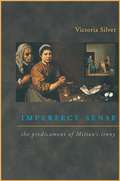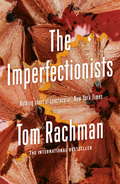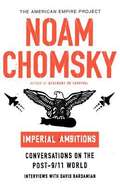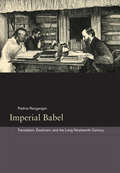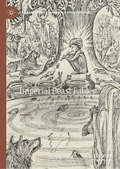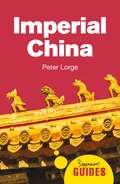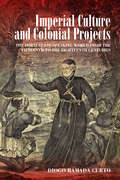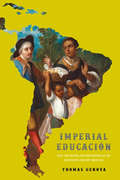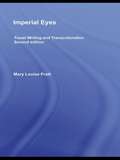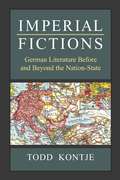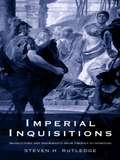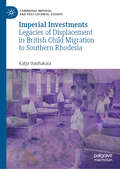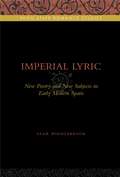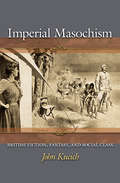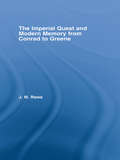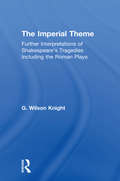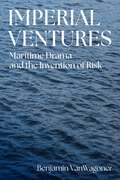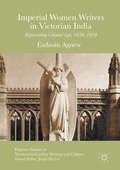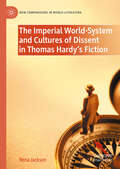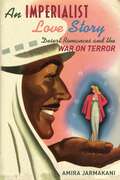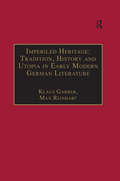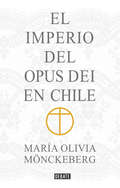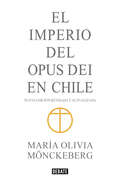- Table View
- List View
Imperatives
by Mark Jary Mikhail KissineImperative sentences usually occur in speech acts such as orders, requests, and pleas. However, they are also used to give advice, and to grant permission, and are sometimes found in advertisements, good wishes and conditional constructions. Yet, the relationship between the form of imperatives, and the wide range of speech acts in which they occur, remains unclear, as do the ways in which semantic theory should handle imperatives. This book is the first to look systematically at both the data and the theory. The first part discusses data from a large set of languages, including many outside the Indo-European family, and analyses in detail the range of uses to which imperatives are put, paying particular attention to controversial cases. This provides the empirical background for the second part, where the authors offer an accessible, comprehensive and in-depth discussion of the major theoretical accounts of imperative semantics and pragmatics.
The Imperfect Friend
by Wendy OlmstedMany writers in early modern England drew on the rhetorical tradition to explore affective experience. In The Imperfect Friend, Wendy Olmsted examines a broad range of Renaissance and Reformation sources, all of which aim to cultivate 'emotional intelligence' through rhetorical means, with a view to understanding how emotion functions in these texts. In the works of Sir Philip Sidney (1554-1586), John Milton (1608-1674), and many others, characters are depicted conversing with one another about their emotions. While counselors appeal to objective reasons for feeling a certain way, their efforts to shape emotion often encounter resistance.This volume demonstrates how, in Renaissance and Reformation literature, failures of persuasion arise from conflicts among competing rhetorical frameworks among characters. Multiple frameworks, Olmsted argues, produce tensions and, consequently, an interiorized conflicted self. By situating emotional discourse within distinct historical and socio-cultural perspectives, The Imperfect Friend sheds new light on how the writings of Sidney, Milton, and others grappled with problems of personal identity. From their innovations, the study concludes, friendship emerges as a favourite site of counseling the afflicted and perturbed.
Imperfect Sense: The Predicament of Milton's Irony
by Victoria SilverWhy do we hate Milton's God? Victoria Silver reengages with a perennial problem in Milton studies, one whose genealogy dates back at least to the Romantics, but which finds its most cogent modern expression in William Empson's revulsion at Milton's God and Stanley Fish's defense. Thoroughly reexamining Milton's theology and its sources in Luther and Calvin, as well as theoretical parallels in the works of Wittgenstein, Cavell, Adorno, and Benjamin, Silver contends that this repugnance is not extrinsic but deliberately cultivated in the theodicy of Paradise Lost. From the vantage of a world riven by injustice, deity can appear to contradict its own revelation, with the result that we experience a God divided against himself. For as Job found in his sufferings, that God appears more ruse than redeemer. Milton's irony recreates this religious predicament in Paradise Lost to the intractable perplexity of his readers, who have in their turn fashioned an equally dissociated Milton--at once unconscious and calculating, heterodox and doctrinaire, heroic and intolerable. Silver argues that, ultimately, these contrary Gods and antithetical Miltons arise from the sense we want to give the speaker's justification, which rather than ratifying our assumptions of meaning and the incoherence they foster, seeks fundamentally to reform them and thus to justify God's ways.
The Imperfectionists: A Novel
by Tom RachmanThe charming and enthralling story of an idiosyncratic English-language newspaper in Rome and the lives of its staffers as the paper fights for survival in the internet age.'A precise, playful fiction with a deep but lightly worn intelligence' - Times Literary SupplementThe newspaper was founded in Rome in the 1950s, a product of passion and a multi-millionaire's fancy. Over fifty years, its eccentricities earned a place in readers' hearts around the globe. But now, circulation is down, the paper lacks a website, and the future looks bleak. Still, those involved in the publication seem to barely notice. The obituary writer is too busy avoiding work. The editor-in-chief is pondering sleeping with an old flame. The obsessive reader is intent on finishing every old edition, leaving her trapped in the past. And the publisher seems less interested in his struggling newspaper than in his magnificent basset hound, Schopenhauer. The Imperfectionists interweaves the stories of eleven unusual and endearing characters who depend on the paper. Funny and moving, the novel is about endings - the end of life, the end of sexual desire, the end of the era of newspapers - and about what might rise afterward.
Imperial Ambitions: Conversations on the Post-9/11 World
by Noam Chomsky David Barsamian[From the book cover] Timely, illuminating, and urgently needed, this volume of interviews conducted by award-winning radio journalist David Barsamian features Noam Chomsky discussing U.S. policies in the increasingly unstable post-9/11 world. In these exchanges, appearing for the first time in print, Chomsky offers his frank, provocative, and informed views on the invasion and occupation of Iraq, the doctrine of preemptive strikes against so-called rogue states, and the growing threat to international peace posed by the U.S. drive for domination. In his inimitable style, Chomsky also dissects the propaganda system that fabricates a mythic past and airbrushes inconvenient facts out of history.
Imperial Babel: Translation, Exoticism, and the Long Nineteenth Century
by Padma RangarajanAt the heart of every colonial encounter lies an act of translation. Once dismissed as a derivative process, the new cultural turn in translation studies has opened the field to dynamic considerations of the contexts that shape translations and that, in turn, reveal translation’s truer function as a locus of power. In Imperial Babel, Padma Rangarajan explores translation’s complex role in shaping literary and political relationships between India and Britain.Unlike other readings that cast colonial translation as primarily a tool for oppression, Rangarajan’s argues that translation changed both colonizer and colonized and undermined colonial hegemony as much as it abetted it. Imperial Babel explores the diverse political and cultural consequences of a variety of texts, from eighteenth-century oriental tales to mystic poetry of the fin de siecle and from translation proper to its ethnological, mythographic, and religious variants.Searching for translation’s trace enables a broader, more complex understanding of intellectual exchange in imperial culture as well as a more nuanced awareness of the dialectical relationship between colonial policy and nineteenth-century literature. Rangarajan argues that while bearing witness to the violence that underwrites translation in colonial spaces, we should also remain open to the irresolution of translation, its unfixed nature, and its ability to transform both languages in which it works.
Imperial Beast Fables: Animals, Cosmopolitanism, and the British Empire (Palgrave Studies in Animals and Literature)
by Kaori NagaiThis book coins the term ‘imperial beast fable’ to explore modern forms of human-animal relationships and their origins in the British Empire. Taking as a starting point the long nineteenth-century fascination with non-European beast fables, it examines literary reworkings of these fables, such as Rudyard Kipling’s Jungle Books, in relation to the global politics of race, language, and species. The imperial beast fable figures variably as a key site where the nature and origins of mankind are hotly debated; an emerging space of conservation in which humans enclose animals to manage and control them; a cage in which an animal narrator talks to change its human jailors; and a vision of animal cosmopolitanism, in which a close kinship between humans and other animals is dreamt of. Written at the intersection of animal studies and postcolonial studies, this book proposes that the beast fable embodies the ideologies and values of the British Empire, while also covertly critiquing them. It therefore finds in the beast fable the possibility that the multitudinous animals it gives voice to might challenge the imperial networks which threaten their existence, both in the nineteenth century and today.
Imperial China: A Beginner's Guide (Beginner's Guides)
by Dr. Peter LorgeIn 221 BCE, the Qin state conquered its neighbours and created the first unified Chinese empire in history. So began the imperial era, where dynasties claiming divine assent ruled for more than 2,000 years. Borders shifted and emperors struggled to exert control over every region of their diverse territories. Elites held that they were inheritors of a rich, pre-imperial culture, while their society produced world-changing inventions such as the compass, printing, gunpowder and the gun. And imperial China itself was altered as it came into contact with others through trade, exploration and war. For anyone curious about this fascinating period, Peter Lorge introduces imperial China&’s major ruling dynasties, religions, arts, thinkers, inventions, military advancements, economic developments and historians.
Imperial Culture and Colonial Projects: The Portuguese-Speaking World from the Fifteenth to the Eighteenth Centuries
by Diogo Ramada CurtoBeyond the immeasurable political and economic changes it brought, colonial expansion exerted a powerful effect on Portuguese culture. And as this book demonstrates, the imperial culture that emerged over the course of four centuries was hardly a homogeneous whole, as triumphalist literature and other cultural forms mingled with recurrent doubts about the expansionist project. In a series of illuminating case studies, Ramada Curto follows the history and perception of major colonial initiatives while integrating the complex perspectives of participating agents to show how the empire’s life and culture were richly inflected by the operations of imperial expansion.
Imperial Educación: Race and Republican Motherhood in the Nineteenth-Century Americas (New World Studies)
by Thomas Genovaempire.New World Studies
Imperial Eyes: Travel Writing and Transculturation
by Mary Louise PrattUpdated and expanded throughout with new illustrations and new material, this is the long- awaited second edition of a highly acclaimed and interdisciplinary book which quickly established itself as a seminal text in its field.
Imperial Fictions: German Literature Before and Beyond the Nation-State (Social History, Popular Culture, And Politics In Germany)
by Todd KontjeImperial Fictions explores ways in which writers from late antiquity to the present have imagined communities before and beyond the nation-state. It takes as its point of departure challenges to the discrete nation-state posed by globalization, migration, and European integration today, but then circles back to the beginnings of European history after the fall of the Roman Empire. Unlike nationalist literary historians of the nineteenth century, who sought the tribal roots of an allegedly homogeneous people, this study finds a distant mirror of analogous processes today in the fluid mixtures and movements of peoples. Imperial Fictions argues that it is time to stop thinking about today’s multicultural present as a deviation from a culturally monolithic past. We should rather consider the various permutations of “German” identities that have been negotiated within local and imperial contexts from the early Middle Ages to the present.
Imperial Inquisitions: Prosecutors and Informants from Tiberius to Domitian
by Steven H. RutledgeDelatores (political informants) and accusatores (malicious prosecutors) were a major part of life in imperial Rome. Contemporary sources depict them as cruel and heartless mercenaries, who bore the main responsibility for institutionalising and enforcing the 'tyranny' of the infamous rulers of the early empire, such as Nero, Caligula and Domitian. Stephen Rutledge's study examines the evidence to ask if this is a fair portrayal.Beginning with a detailed examination of the social and political status of known informants and prosecutors, he goes on to investigate their activities - as well as the rewards they could expect. The main areas covered are: * checking government corruption and enforcing certain classes of legislation * blocking opposition and resistance to the emperor in the Senate* acting as a partisan player in factional strife in the imperial family* protecting the emperor against conspiracy.The book includes a comprehensive guide to every known political informant under the early empire, with their name, all the relevant primary and secondary sources, and an individual biography.
Imperial Investments: Legacies of Displacement in British Child Migration to Southern Rhodesia (Cambridge Imperial and Post-Colonial Studies)
by Katja UusihakalaThis book examines the legacy of a British child migration scheme that relocated British children to Southern Rhodesia between 1946 and 1962, with the aim of populating the colony with “fresh white stock”. The selected children were resettled at Rhodesia Fairbridge Memorial College, a boarding school established in a disused RAF airbase outside the town of Bulawayo. This social engineering project sought to “rescue” children from what were predicted as undesirable futures in Britain and offer them a “better life” with prospects of social advancement. Yet, beyond individual salvation, the scheme emigrated the children with the intention that they would help sustain the racially segregated colonial order. Building on long-term ethnographic research with former Rhodesian child migrants, now living in the UK, South Africa, Australia, and New Zealand, this book delves into the children’s unique experiences of migration, displacement, and resettlement. By highlighting these enduring emotional, social, and political repercussions, the author critically addresses how colonial histories matter in the present. Through the lens of former child migrants – whose kin relations were ruptured, who were disciplined into silence and suppression, and who have seen scant public recognition of their past – this book sheds light on the formation of memory through its gaps and silences. It contributes to our understanding of memory in relation to forced migration and displaced communities.
Imperial Lyric: New Poetry and New Subjects in Early Modern Spain (Penn State Romance Studies #7)
by Leah MiddlebrookPresent scholarly conversations about early European and global modernity have yet to acknowledge fully the significance of Spain and Spanish cultural production. Poetry and ideology in early modern Spain form the backdrop for Imperial Lyric, which seeks to address this shortcoming. Based on readings of representative poems by eight Peninsular writers, Imperial Lyric demonstrates that the lyric was a crucial site for the negotiation of masculine identity as Spain’s noblemen were alternately cajoled and coerced into abandoning their identifications with images of the medieval hero and assuming instead the posture of subjects. The book thus demonstrates the importance of Peninsular letters to our understanding of shifting ideologies of the self, language, and the state that mark watersheds for European and American modernity. At the same time, this book aims to complicate the historicizing turn we have taken in the field of early modern studies by considering a threshold of modernity that was specific to poetry, one that was inscribed in Spanish culture when the genre of lyric poetry attained a certain kind of prestige at the expense of epic. Imperial Lyric breaks striking new ground in the field of early modern studies.
Imperial Masochism: British Fiction, Fantasy, and Social Class
by John KucichBritish imperialism's favorite literary narrative might seem to be conquest. But real British conquests also generated a surprising cultural obsession with suffering, sacrifice, defeat, and melancholia. "There was," writes John Kucich, "seemingly a different crucifixion scene marking the historical gateway to each colonial theater." In Imperial Masochism, Kucich reveals the central role masochistic forms of voluntary suffering played in late-nineteenth-century British thinking about imperial politics and class identity. Placing the colonial writers Robert Louis Stevenson, Olive Schreiner, Rudyard Kipling, and Joseph Conrad in their cultural context, Kucich shows how the ideological and psychological dynamics of empire, particularly its reorganization of class identities at the colonial periphery, depended on figurations of masochism. Drawing on recent psychoanalytic theory to define masochism in terms of narcissistic fantasies of omnipotence rather than sexual perversion, the book illuminates how masochism mediates political thought of many different kinds, not simply those that represent the social order as an opposition of mastery and submission, or an eroticized drama of power differentials. Masochism was a powerful psychosocial language that enabled colonial writers to articulate judgments about imperialism and class. The first full-length study of masochism in British colonial fiction, Imperial Masochism puts forth new readings of this literature and shows the continued relevance of psychoanalysis to historicist studies of literature and culture.
The Imperial Quest and Modern Memory from Conrad to Greene (Literary Criticism and Cultural Theory)
by Julia RawaFirst Published in 2005. Routledge is an imprint of Taylor & Francis, an informa company.
Imperial Theme - Wilson Knight: Further Interpretations Of Shakespeare's Tragedies Including The Roman Play
by G. Wilson KnightFirst Published in 2002. Routledge is an imprint of Taylor & Francis, an informa company.
Imperial Ventures: Maritime Drama and the Invention of Risk
by Benjamin VanWagonerLinks early modern English drama and empire studies, exploring how staged scenes of maritime peril created a new form of economic uncertaintyImperial Ventures links early modern English drama and empire studies, exploring how staged scenes of maritime peril created a new form of economic uncertainty around the turn of the seventeenth century, amid London’s explosion in commercial colonialism.While the hazards of global maritime trade became increasingly apparent during the late sixteenth and early seventeenth centuries, the word “risk” did not enter English usage until around 1660. The prevailing scholarly narrative has linked uncertainty to concepts such as “chance,” “accident,” and “providence,” but this book reveals that these fragmentary concepts were reordered into an economic abstraction, and that the theater was a key site for that process. Playwrights reached for ways to represent this new uncertainty, and audiences watched perilous voyages set in colonial contexts and dramatized in increasingly typical forms. Imperial Ventures is organized by these forms, with five chapters examining scenes of shipwreck, pirates, enslavement, colonial subjection, and perilous news across a wide range of early modern plays.Benjamin VanWagoner shows how maritime drama connected English venturing to economic vulnerability in increasingly systematic ways, helping to develop the economic logic that would come to be codified as risk. In revealing this process, Imperial Ventures establishes the unique protocolonial status of early modern England—in the theater and at sea—and demonstrates how risk became a perverse instrument for justifying Anglophone imperialism.
Imperial Women Writers in Victorian India
by Éadaoin AgnewThis book is about Victorian women's representations of colonial life in India. These accounts contributed to imperial rule by exemplifying an idealized middle-class femininity and attesting to the Anglicisation of the subcontinent. Writers described familiarly feminine modes of experience, focusing on the domestic environment, household management, the family, hobbies and pastimes, romance and courtship and their busy social lives. However, this book reveals the extent to which their lives in India bore little resemblance to their lives in Britain and suggests that the acclaimed transportation of the home culture was largely an ideological construct iterated by women writers in the service of the Raj. In this way, they subverted the constraints of Victorian gender discourses and were part of a growing proto-feminism.
The Imperial World-System and Cultures of Dissent in Thomas Hardy's Fiction (New Comparisons in World Literature)
by Rena JacksonThis is the first book-length study of imperial crossings in Thomas Hardy’s novels and short stories. Combining the strengths of world-literary and world-systems analyses with a cultural materialist approach, the study offers unparalleled coverage of global links in Hardy’s fiction, engaging, in addition, with a range of dissenting responses – at both formal and thematic registers – to the British world-system’s exploitative structures. Hardy’s prose outputs reveal that the empire, contrary to popular critical assumptions in postcolonial studies, did not harmonise the classes, genders or regions into a shared national imperial identity, culture or destiny. A major component of the study additionally includes comparative readings of the 'modern' world-system and imperial sociality in writings by Joseph Conrad, H. Rider Haggard, Elizabeth Gaskell, Rudyard Kipling, David Livingstone, and in Chartist poetry. The book will be an invaluable resource to teachers, students and enthusiasts working in the field of world literature, and in Victorian, postcolonial and settler colonial studies.
An Imperialist Love Story: Desert Romances and the War on Terror
by Amira JarmakaniA curious figure stalks the pages of a distinct subset of mass-market romance novels, aptly called “desert romances.” Animalistic yet sensitive, dark and attractive, the desert prince or sheikh emanates manliness and raw, sexual power. In the years since September 11, 2001, the sheikh character has steadily risen in popularity in romance novels, even while depictions of Arab masculinity as backward and violent in nature have dominated the cultural landscape. An Imperialist Love Story contributes to the broader conversation about the legacy of orientalist representations of Arabs in Western popular culture. Combining close readings of novels, discursive analysis of blogs and forums, and interviews with authors, Jarmakani explores popular investments in the war on terror by examining the collisions between fantasy and reality in desert romances. Focusing on issues of security, freedom, and liberal multiculturalism, she foregrounds the role that desire plays in contemporary formations of U.S. imperialism. Drawing on transnational feminist theory and cultural studies, An Imperialist Love Story offers a radical reinterpretation of the war on terror, demonstrating romance to be a powerful framework for understanding how it works, and how it perseveres.
Imperiled Heritage: Selected Essays by Klaus Garber (Studies in European Cultural Transition #5)
by Klaus Garber Max Reinhart Martin Stannard Greg WalkerThe most prolific historian of early modern German literature in the twentieth century, Klaus Garber has largely remained unknown to English-language scholars. The seven essays selected here are translated into English for the first time and represent the ’essence’ of Garber’s work. Central to Garber’s outlook is a break with the traditional canonization of culture into national categories. Moreover, he argues that literary history consists not only of intellectual history, but also political and social history. As he states in his preface to this volume: ’To bring Old Europe to life in all the variety of its cultural landscapes; to hear across space and time the voices that praised this multiplicity as a valuable possession; to be inspired by the past to respond to our own needs - these tasks constitute the noblest goal of early modern literary studies today.’
El Imperio del Opus Dei en Chile
by Maria Olivia MonckebergUna rigurosa investigación sobre la agrupación religiosa más importante y poderosa en nuestro país El Imperio del Opus Dei en Chile da cuenta en detalle de las características de esta organización, que logró en España su consolidación bajo la dictadura de Francisco Franco y que en Chile tuvo un importante crecimiento después de que su fundador, Josemaría Escrivá de Balaguer, visitara en 1974 nuestro país. A partir de entonces comenzó una silenciosa expansión. Lo hizo mediante la creación de colegios y sociedades y la adquisición de propiedades. La Universidad de los Andes, a su vez, se ha transformado en su principal proyecto. Con el acucioso estilo que caracteriza a María Olivia Mönckeberg, este libro #en una segunda edición actualizada# indaga en la historia de cientos de hombres y mujeres que en Chile, al tiempo que buscan su santificación en el trabajo, incrementan sus redes de poder, alcanzando una insospechada influencia en diferentes planos de la vida nacional.
Imperio del Opus Dei en Chile
by Maria Olivia MonckebergMaría Olivia Mönckeberg, fiel a su estilo riguroso de investigación, presenta en esta nueva edición un retrato ampliado y puesto al día de esta institución religiosa y su soterrada presencia en Chile. Durante los últimos años el Opus Dei se ha consolidado como una de las agrupaciones religiosas más importantes en nuestro país. Su voz se ha escuchado con fuerza para imponer su punto de vista en varias políticas públicas. El Imperio del Opus Dei en Chile da cuenta en detalle de las características de esta organización, que logró en España su consolidación bajo la dictadura de Francisco Franco y que en Chile tuvo un importante crecimiento después de que su fundador, Josemaría Escrivá de Balaguer, visitara en 1974 nuestro país. A partir de entonces comenzó una silenciosa expansión. Lo hizo mediante la creación de colegios y sociedades y la adquisición de propiedades. La Universidad de los Andes, a su vez, se ha transformado en su principal proyecto. Con el acucioso estilo que caracteriza a María Olivia Mönckeberg, este libro - en una segunda edición actualizada- indaga en la historia de cientos de hombres y mujeres que en Chile, al tiempo que buscan su santificación en el trabajo, incrementan sus redes de poder, alcanzando una insospechada influencia en diferentes planos de la vida nacional.

